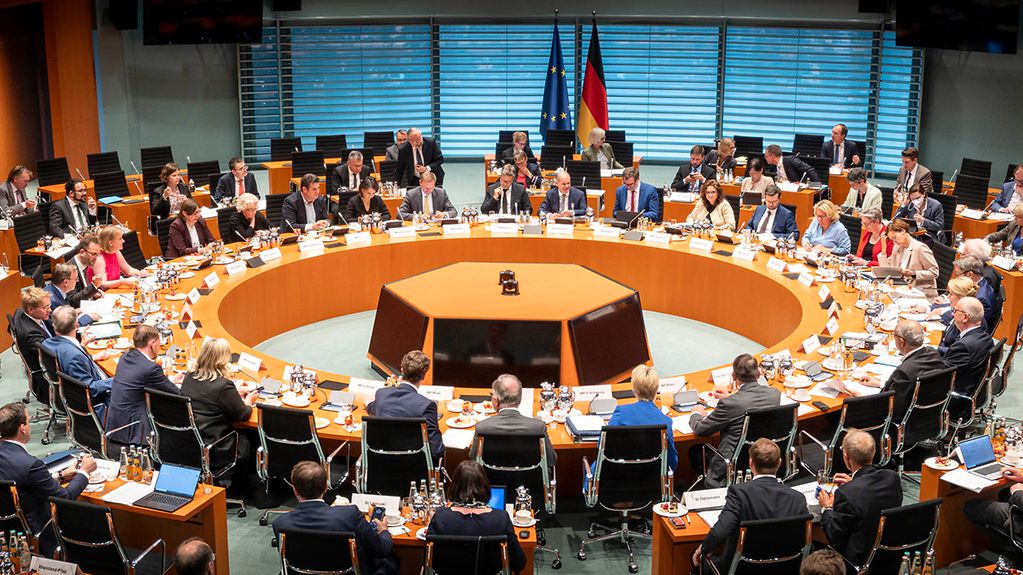Federation-Länder talks
Russia’s war of aggression against Ukraine and its impact on Germany and Europe were the focus of the Federal Chancellor’s consultations with the Heads of Government of the Länder. Another agenda item was the coronavirus pandemic. The situation here had “improved considerably”, stressed the Federal Chancellor.

The Federal-Länder consultations again took place as face-to-face talks at the Chancellery. A big “family reunion”, said Federal Chancellor Scholz.
Photo: Federal Government/Bergmann
The war in Ukraine and its repercussions in Germany dominated the Federal Chancellor’s consultations with the Länder: “We agree on the need for solidarity,” said the Federal Chancellor after the consultations at the Chancellery. Implementation of the agreed resolutions was already well underway, he added.
Since the start of Russia’s war of aggression against Ukraine, Federal Chancellor Scholz has repeatedly spoken of a “turning point” in security and defence policy. “The world is no longer the same as it was before this war,” said the Federal Chancellor.
European security has been shaken
The Federal Chancellor and the Heads of Government unanimously stated that the Russian President’s war of aggression in Ukraine had shaken the foundations of European security as it had existed since the fall of the Iron Curtain and German reunification, and Germany and its partners and allies had been forced to respond.
Initial measures have been initiated by the Federal Government, such as establishing a special fund for the Federal Armed Forces worth 100 billion euros.
The Federal and Länder Governments agree that economic sanctions, arms deliveries and plans to equip the Federal Armed Forces must now be implemented or maintained.
Goal: independence from Russian gas
Federal Chancellor Scholz and the Heads of Government of the Länder also discussed in detail the rising energy prices and the issue of energy supply security in connection with the war. The consensus was that relief from energy costs had to be provided wherever necessary. The Federal and Länder Governments agreed that current energy prices were a major burden on private households and the economy.
Scholz said the Federal Government was observing developments on the energy market very closely. The primary goal was to become independent of Russian gas as quickly as possible in terms of energy supply – which would include the supply of liquefied gas, he said. “A whole range of new laws are being introduced at great speed so as to create the basis for new import options on the North German coast with links to the German gas grid,” Scholz emphasised.
For the future, it was vital for Germany to become independent of fossil energy imports as quickly as possible – not just from Russia “but from all such imports”, said the Federal Chancellor. As such, the expansion of renewable energies was a major issue, he added; it was also discussed with the Heads of Government of the Länder.
Rapid assistance and targeted integration
There has been a steadily increasing movement of refugees since the beginning of the war, and large numbers of Ukrainian refugees have already arrived in Germany. The Federal Chancellor and the Heads of Government also discussed issues of reception and distribution in their talks, as well as targeted integration measures.
Sound integration from the outset was crucial, said the Federal Chancellor. In future, increased joint efforts by the Federal Government and the Länder would be necessary so as to provide all refugees in Germany with rapid assistance and give them prospects for the future.
Coronavirus pandemic: preparations for autumn and winter
The Federal Chancellor also spoke to the Heads of Government of the Länder about the coronavirus pandemic and the preparations required for autumn and winter. The situation had “improved considerably”, stressed Federal Chancellor Scholz. Nevertheless, he said, everyone was aware that things might change in autumn and winter.
The legal basis for protective measures is now to be created so as to ensure that the full range of options is available for action in autumn. Looking ahead to autumn and winter, the Federal and Länder Governments also agreed that there should be no blanket closure of schools and childcare facilities.
State Premiers’ Conferences (MPK) are meetings of the Heads of Government of the 16 Länder with the aim of coordinating policy. They address topics at federal and state level as well as current European and international issues. Twice a year (in June and December), the state premiers subsequently meet with the Federal Chancellor. One federal state chairs the conference each year, subject to a predetermined sequence. The chair is currently held by North Rhine-Westphalia.